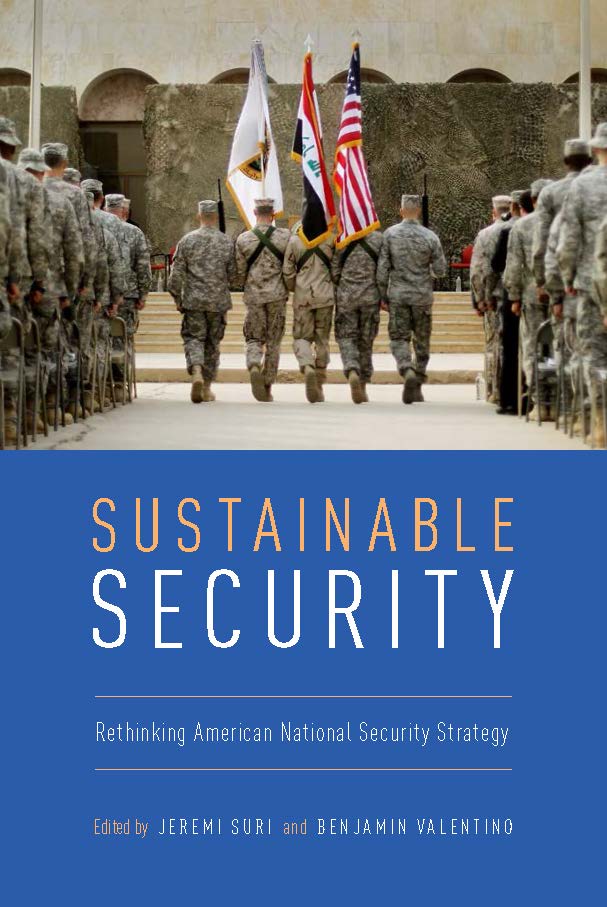
Summary
Edited by Jeremi Suri (University of Texas, Austin) and Benjamin Valentino (Dartmouth).
Published by Oxford University Press.
Support for this project was provided in part by a grant from Carnegie Corporation of New York.
As the world shifts away from the unquestioned American hegemony that followed in the wake of the Cold War, the United States is likely to face new kinds of threats and sharper resource constraints than it has in the past. However, the country’s alliances, military institutions, and national security strategy have changed little since the Cold War. American foreign and defense policies, therefore, should be assessed for their fitness for achieving sustainable national security amidst the dynamism of the international political economy, changing domestic politics, and even a changing climate.
This book brings together fifteen leading scholars from across political science, history, and political economy to highlight a range of American security considerations that deserve a larger role in both scholarship and strategic decision-making. In these chapters, scholars of political economy and the American defense budget examine the economic engine that underlies U.S. military might and the ways the country deploys these vast (but finite) resources. Historians illuminate how past great powers coped with changing international orders through strategic and institutional innovations. And regional experts assess America’s current long-term engagements, from NATO to the chaos of the Middle East to the web of alliances in Asia, deepening understandings that help guard against both costly commitments and short-sighted retrenchments.
This interdisciplinary volume sets an agenda for future scholarship that links politics, economics, and history in pursuit of sustainable security for the United States – and greater peace and stability for Americans and non-Americans alike.
|
Contents
Introduction: Sustainable Security: Rethinking American National Security Strategy
Jeremi Suri, Mack Brown Distinguished Professor for Global Leadership, History, and Public Policy, University of Texas at Austin
Benjamin Valentino, Associate Professor of Government, Dartmouth College
SECTION I. RECALIBRATING NATIONAL SECURITY STRATEGY
- Dollar Diminution and New Macroeconomic Constraints on American Power
Jonathan Kirshner, Stephen and Barbara Friedman Professor of International Political Economy, Cornell University
- Does Military Power Attract Foreign Investment?
Daniel Drezner, Professor of International Politics, Fletcher School of Law and Diplomacy, Tufts University
Nancy Hite-Rubin, Assistant Professor of Political Economy, Fletcher School of Law and Diplomacy, Tufts University
- Preserving National Strength in a Period of Fiscal Restraint
Cindy Williams, Research Affiliate, Security Studies Program, Massachusetts Institute of Technology
- State Finance and National Power: Great Britain, China, and the United States in Historical Perspective
Jeremi Suri, Mack Brown Distinguished Professor for Global Leadership, History, and Public Policy, University of Texas at Austin
- Reforming American Power: Civilian National Security Institutions in the Early Cold War and Beyond
William Inboden, Associate Professor of Public Affairs, University of Texas at Austin
- To Starve an Army: How Great Power Armies Respond to Austerity
John W. Hall, Ambrose-Hesseltine Associate Professor of U.S. Military History, University of Wisconsin, Madison
- Climate Change and U.S. National Security: Sustaining Security Amidst Unsustainability
Joshua W. Busby, Associate Professor of Public Affairs, University of Texas at Austin
- At Home Abroad: Public Attitudes towards America's Overseas Commitments
Benjamin Valentino, Associate Professor of Government, Dartmouth College
- The Right Choice for NATO
William Wohlforth, Daniel Webster Professor of Government, Dartmouth College
- The United States and the Middle East: Interests, Risks, Costs
Daniel Byman, Professor, School of Foreign Services, Georgetown University
Sara Bjerg Moller, Assistant Professor of International Security, Seton Hall University
- Keep, Toss, or Fix? Assessing U.S. Alliance in East Asia
Jennifer Lind, Associate Professor of Government, Dartmouth College
- Terminating the Interminable?
Sumit Ganguly, Rabindranath Tagore Chair in Indian Cultures and Civilizations and Professor of Political Sciences, Indiana University, Bloomington
- Neutralization as a Sustainable Approach to Afghanistan
Audrey Kurth Cronin, Distinguished Service Professor, School of Policy, Government, and International Affairs, George Mason University
Conclusion
Jeremi Suri, Mack Brown Distinguished Professor for Global Leadership, History, and Public Policy, University of Texas at Austin
Benjamin Valentino, Associate Professor of Government, Dartmouth College
|


